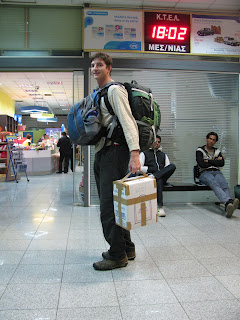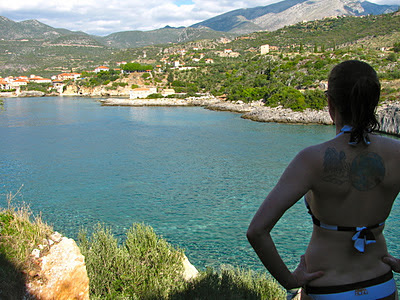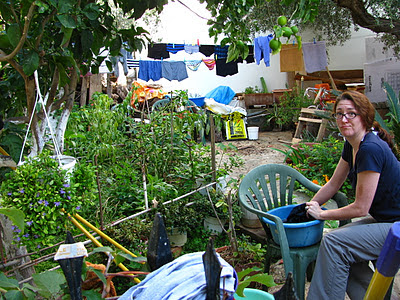(WARNING - The follow entry depicts an experience so idyllic that we even hate ourselves a little bit. Readers may experience feelings of envy and an intense desire to quit their jobs and strike off for lands unknown.)
Kardamyli, Greece: It was a straightforward bus trip from Athens to Kalamata to Kardamyli, save for a three hour layover in Kalamata which, in spite of it’s
olive-y fame, isn’t much to look at. We arrived after dark with no place to stay. We had the name of a possible lodging, but found it to be shuttered and dark. We eventually worked up the nerve to knock on the door of a house that advertised “domatia,” rooms to rent, but was also very quiet and shuttered up. Thankfully a round and friendly woman came to the door, let us have our pick of the rooms, and then spent 5 or 10 minutes cleaning up the room and making the bed. At 30 euros a night, we felt we had scored. Then we woke up and found ourselves here:
Upon exploring this cute seaside village we immediately fell in love. Cobblestone streets, sidewalk cafes, turquoise blue water and white stone beaches.
As I type this blog I am listening to opera music from the balcony across the way. Every day the man who lives there blasts his record collection, sometimes singing along and sometimes entertaining comments from passers by. Our days here go something like this: wake up, throw open the shutters and marvel at the view out the window, breakfast of yogurt and fruit on the patio, stroll down to a cafe for coffee and internet, return home to make sandwiches and prepare for our afternoon adventure (to the surreal music wafting in through the window,) strike out to the beach or the hills, come home, watch the sunset, prepare Greek salad for dinner, and go to bed early. Yes, life is rough right now. Sigh.
Our first full day in Kardamyli we had a relaxing time exploring the beach north of our domatia.
On our second day in Kardamyli we ventured off into the hills on a long hike that took us to the teensy-tinsy villages of Petrovouni and Agia Sofia, across a gorge and to the site of “Old Kardamyli.”
Our third and final day in Kardamyli we swam from the port to a small island with our picnic lunch afloat in a Mickey Mouse raft. (Don’t be fooled by the sunshine. The water and the wind here are fairly cool. Thankfully we are of hearty north-west stock.)
We're definitely coming back. Maybe after harvesting olives in Kyparissia to WWOOF with a fellow we met or maybe next year or maybe some June in the future.












 ()
()







































